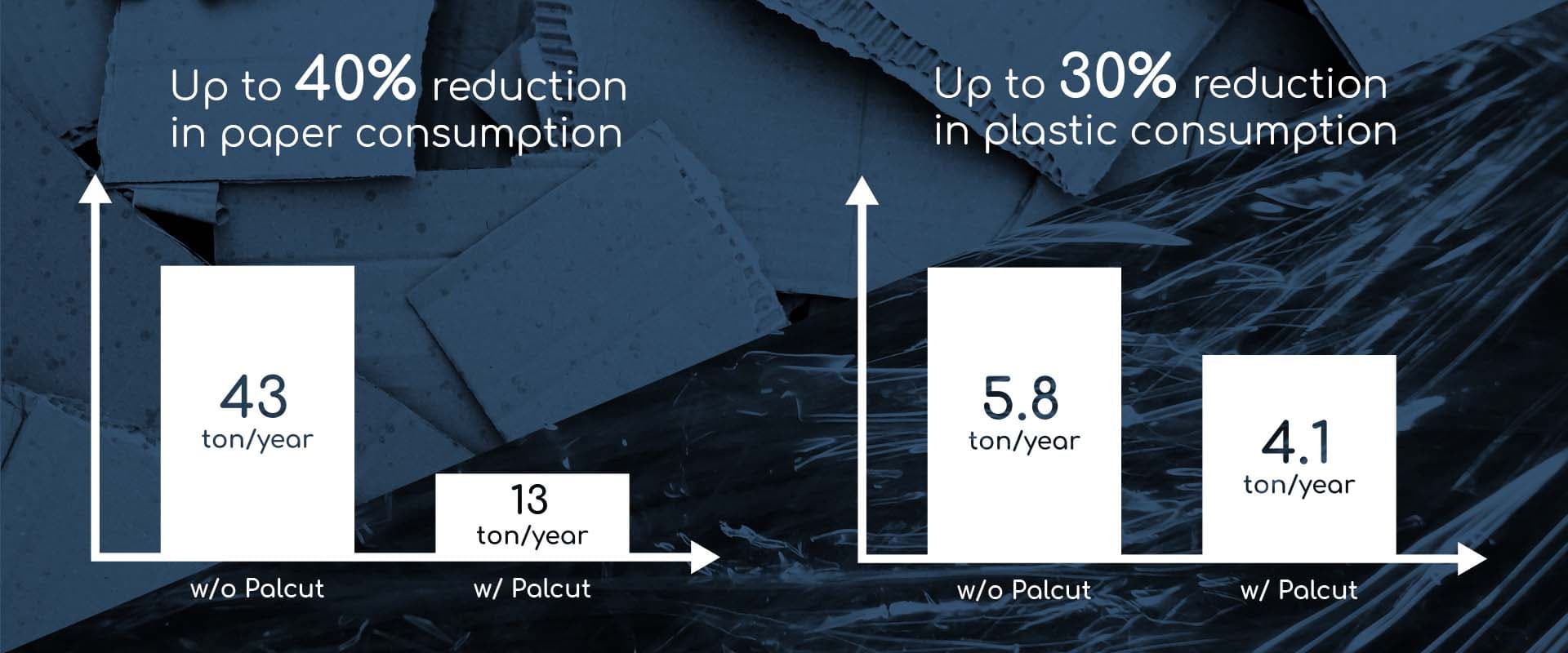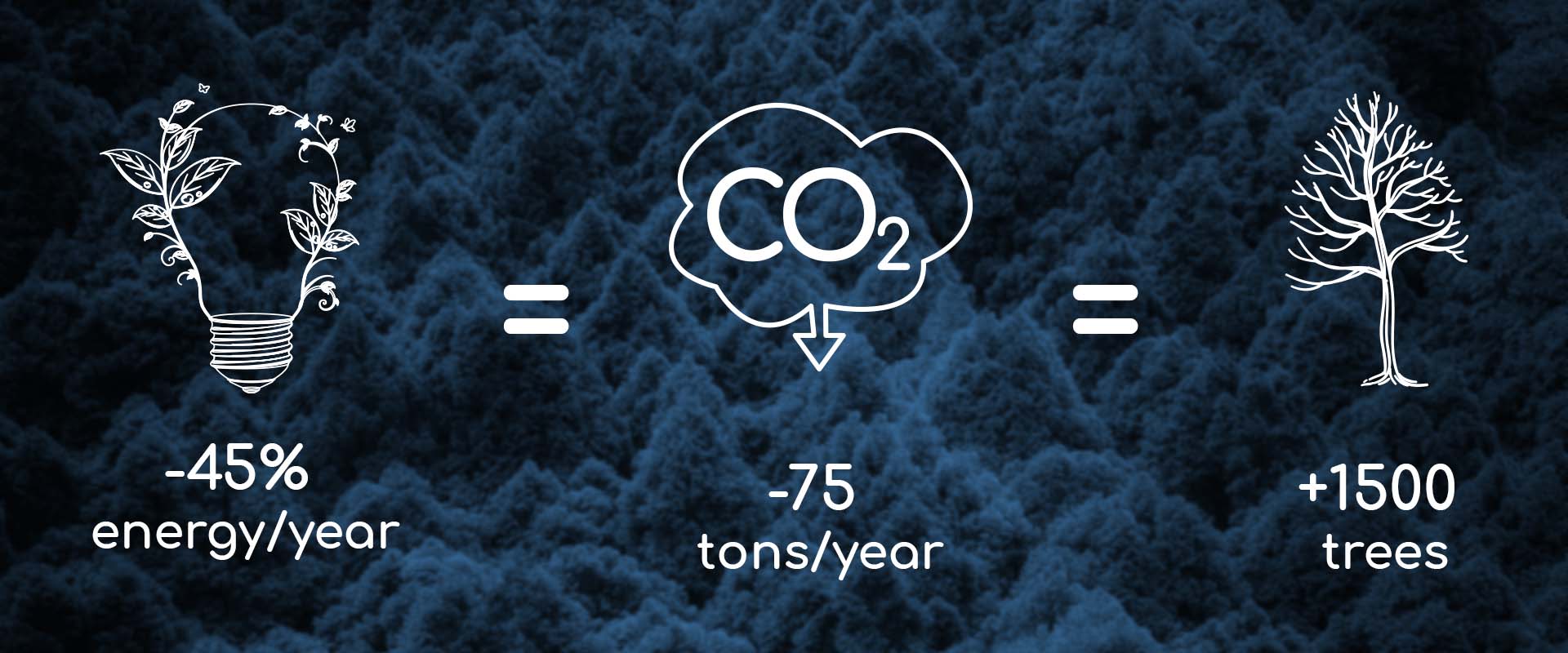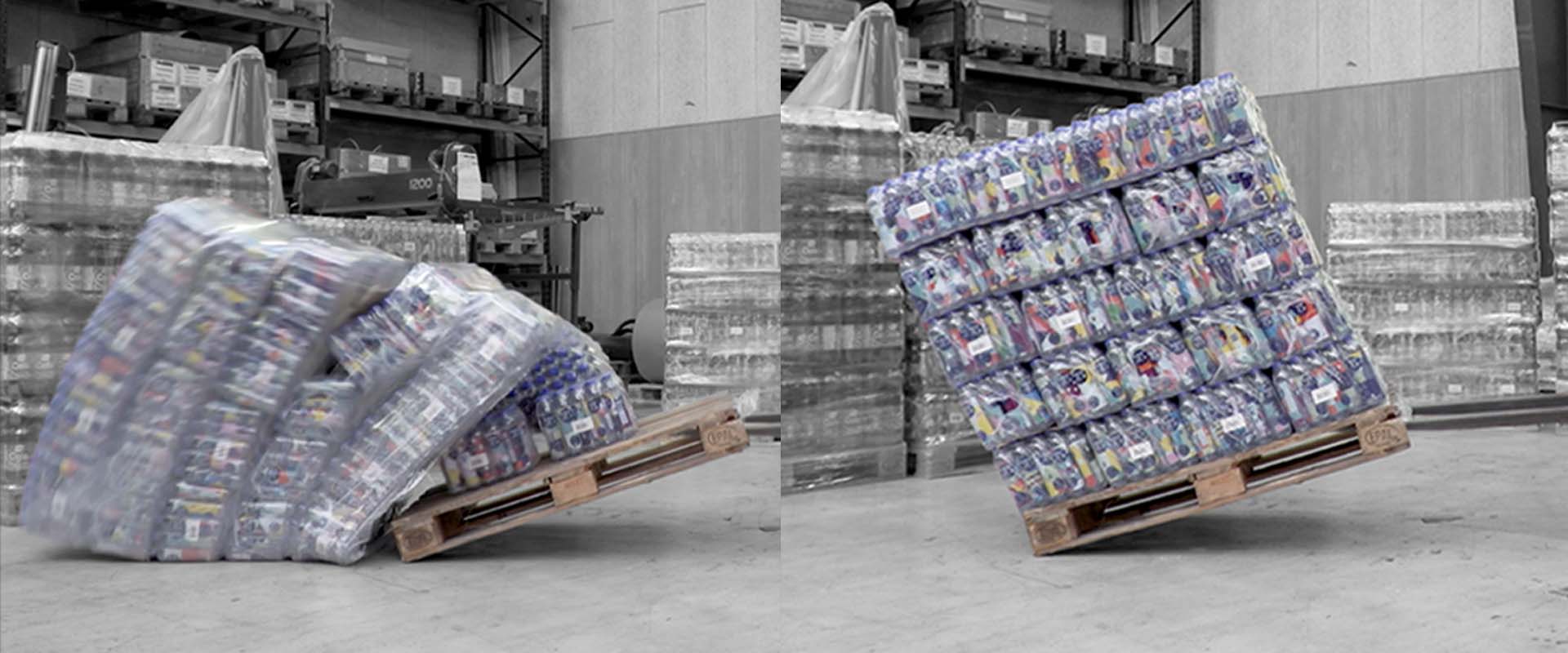
Why you need an environmentally sustainable palletising solution
Sustainability – and sustainable packaging materials – are right at the top of everyone’s minds these days. And for a very good reason. There’s no doubt that businesses have a common need and desire to improve initiatives to help protect the environment.
When it comes to packaging, particularly with single-use, we are facing a global challenge. Our way of consumption has led to discarded packaging swamping the ocean and finding its way to places where it shouldn’t be, having a detrimental impact on the state of our planet.
Eco-friendly packaging is becoming an inevitable part of our everyday lives. More and more options are being developed across the globe, and we at Palcut care deeply about bringing a strong environmental focus on today’s palletising lines. Choosing our automatic sheet dispenser for palletisation can enable your business to reduce your ecological impact. Read on to learn more about how our sheet dispensers and anti-slip paper can benefit you, your company and our planet all at the same time.
Reducing your business’ paper consumption and environmental footprint
The eradication of packaging materials is a fantasy, but a reduction of – or focusing on sustainable – packing materials is a goal anyone can reach. Paper, for example, is central to many businesses’ packaging solutions. Paper consumption primarily results in deforestation all over the planet, contributing to climate change, loss of animal habitats, and soil erosion. When we reduce how much paper we use, it directly limits pollution, cuts energy use, and saves forests.
Paper is a large part of nearly any packaging line, and this is where choosing a Palcut solution can help reduce your paper consumption and environmental footprint. Compared to using corrugated cardboard in traditional pallet sheet racks, Palcut’s sheet dispensing solution reduces the total consumption of packaging materials by up to 40% on paper and 30% on plastic.

Lowering your energy consumption with our anti-slip paper
One way our solution generates less overall waste is by using our dispenser. It produces one sheet at a time and therefore eliminates any challenges with the packaging robot dropping sheets. As a bonus, it also uses recyclable paper! Palcut’s Antim anti-slip paper is made from FSC® certified paper, which guarantees that only recycled paper is used in production. More information about that can be found here.
Another way we have sought to reduce our environmental footprint is by looking at our own production. At Palcut, we have managed to cut 45% of energy consumption in the production of our anti-slip paper, corresponding to 75 tonnes of CO2 per year. That saved CO2 is the equivalent of over 1500 trees! As a direct result, our industrial customers also benefit from this reduction in CO2 regarding their packaging consumption.
To reduce the energy consumption in our production, we have looked at how we cure the unique coating on our anti-slip paper. The special coating is applied to the paper creating the friction that stabilises pallets of products during transportation and storage. It also protects your goods from being damaged while simultaneously reducing packaging material.
The coating process used in our paper production does require a lot of heat and thus energy. Our production line has installed 432 heating panels that cures the coating on the anti-slip paper. In our efforts to reduce energy consumption, we’ve replaced our old heating panels with an entirely new generation of infrared ceramic heating panels. These state-of-the-art heating panels ensure that the energy consumption during production has been reduced significantly.

Reducing the use of stretch foil in the palletising process
Besides the use of paper and corrugated cardboard, stretch foil is a vital part of the palletising process. It helps to secure the products on the pallet so they’re safe for transportation and reduces possible damage to the products.
This means that every single day, a large amount of plastic foil is used all around the world to wrap pallets. If you’re thinking about how your business can minimise the usage of stretched plastic foil whilst protecting the environment during your production, Palcut’s Antim® anti-slip paper is the perfect choice.
Palcut’s Antim anti-slip paper is a great tool that helps decrease the amount of stretch foil needed to wrap around the pallet during the palletising process. The paper’s friction ‘binds’ the layers together, allowing you to reduce the number of turns a pallet needs to be wrapped with stretch foil. In turn, this enhances stabilisation during transportation and storage, as well as lowering the risk of damage to the products while they’re on the road.
Compared to corrugated cardboard, our anti-slip paper is thinner, which ultimately reduces the total amount of waste generated in packaging your products. In addition, it frees up additional space and allows you to have rolls of anti-slip paper delivered with up to five times the amount of paper in contrast to corrugated cardboard sheets on pallets. The solution is simple, Antim anti-slip paper is cost economical, efficient and most importantly, environmentally friendly.

Avoiding more than excess waste
Packaging materials are a necessity for transporting goods, and it’s a vital part of our global markets. From the producers to possible shipping lines or distributors, your products will exchange many hands before they arrive at their final destination. Without proper packaging, products can risk scratches, tears and irreparable damage. For consumer products, this can be especially harmful; we all know that most of us tend to avoid damaged boxes and cans on the shelves when we pop into a grocery store.
Cutting back on packaging is a great first step in making your company more sustainable, but you might be worried about other risks too. Reducing packaging can cause issues like jeopardising the stability of the entire pallet, potentially causing a safety hazard during transportation. Or products could be crushed by weight when stacked, or collapse while in stock, or, in a worst-case scenario, the pallets could tip over and severely injure others.
At Palcut, we can allay your fears; we know packaging materials are essential for products to be protected during storage and transportation, in display environments, or on retailers’ shelves.
Our interlayer paper works not only smarter but harder, saving you time, money and storage. The unique coating, we put on our paper helps our Antim anti-slip paper have a slip angle of more than 50°, ensuring excellent stability of your products. In addition, our Liquim paper has a liquid resistant barrier, so you won’t have to worry about liquids breaking down the paper either.
Besides being cost-effective and environmentally sustainable, the Palcut sheet dispenser can also help you avoid general downtime in your production. Unnecessary downtime is a valid concern for most manufacturers, as it often ends up directly affecting profit. Our process makes it easily automated to make sure your production lines run as smoothly as ever, saving your operators time, in turn allowing them to be more productive in other areas of your business.
Helping the environment – one small step at a time
At Palcut, we are specialists in environmentally sustainable palletising. We’ve made sure we have optimised the effectiveness of production lines and the palletising process. We care about the planet as well as your productivity, and we wish to help you on your journey towards sustainable, eco-friendly packaging and palletising solutions.
Many businesses are concerned with their impact on wildlife. Reducing overall paper consumption and foil consumption is a goal that we can help you meet effortlessly. You can take pride in shrinking your carbon footprint whilst saving your company money. By choosing the Palcut sheet dispenser solution, you support our efforts to push the industry to produce sustainably for the benefit of the environment.
Thinking green and sustainably is simply part of our DNA. Thank you for your interest in helping our planet. Please feel free to reach out if you have any questions about what you’ve learned today.




